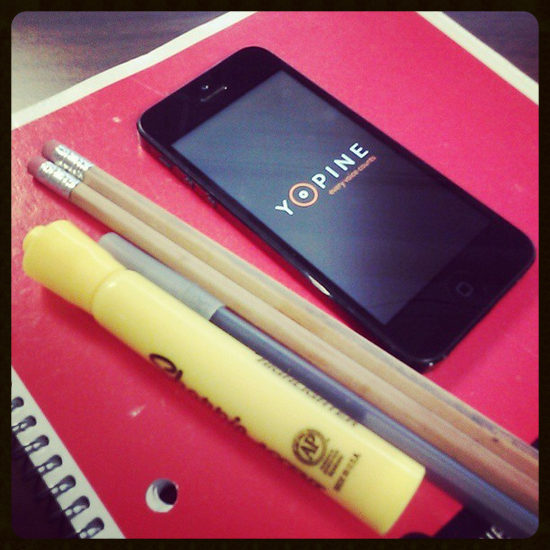by Maryann Chan - Yopine
When users turn to Yopine, they can choose from categories such as meeting, food, fun, and shopping, among other things to help them make quick decisions. It allows for opinion gathering on all aspects of the everyday life. Yopine caters much to its users’ social life, but it is also a useful tool in other areas. TechCocktail named 2013 the Year of the Open Educational Resource (OER) after 2012’s Year of the Mass Open Online Course (MOOC). As students look for free materials and cost efficient methods to assist with the stress and burdening costs of higher education, Yopine will enter into academia as one of these resources.
Dr. Christopher Harrison, Assistant Professor of analytical and bioanalytical chemistry at San Diego State University, often tries to get feedback from his large lectures of often six hundreds + students. He has firsthand experience of the issues that come with a few of the common feedback tools that are currently used in the classroom, and describes how Yopine could be useful in the academic setting.
Where did you hear about Yopine and what would you say was the 'value spark' i.e. its value in your field?
I came across a mention of the app on The Unofficial Apple Weblog’s review of some notable apps from the Disrupt NY 2013 conference. As an educator who uses classroom response systems to get feedback from my students the rapid group polling offered by Yopine sounded like an appealing alternative to the current technologies.
The iClicker is a widely used method of polling students in a large lecture. Where does Yopine come in to change what the iClickers are already doing? What are you using now? What specifically is it that has you looking for an improved solution?
Though iClickers and similar products are available and constantly evolving, they have the detriment of being an added item for the students (and often the instructor) to purchase and bring with them to a lecture. I prefer to give my lectures from an iPad for a number of reasons, but to my knowledge the clicker systems all require a local receiver to be plugged into a computer to obtain the results of the polls, something which isn’t feasible when using an iPad.
Currently I have been using Polleverywhere as the system is entirely web-based for the instructor and allows students to respond with their own devices, either cellphones or computers. The one drawback to Polleverywhere that I have encountered is the need to students to enter codes prior to submitting answers to the polls. A system where I could push the polls to the students would advantageous and help speed up the polling process.
It's becoming clear that real-time, live interaction between students and teachers isn't a luxury but, rather, a requirement. We believe that interaction has to be as near frictionless as possible. Would you agree, why?
Getting students to interact with the material as it is being presented, rather than having them wait until they need to do an assignment to see if they have grasped the concepts covered previously in the lecture is a key to aiding the students in mastering the materials. Given the size of some classes, and just the hesitance of some students to open respond to questions in class, a system that delivers the questions right into their hands, where they can answer questions immediately is very beneficial. Given that, the easier it is for a student to participate in the questions/polling the more likely they are to make use of the system. So removing barriers, such as purchasing additional devices, or entering numerous codes, can simplify the interactions greatly.
Question asked... Question answered.
Can you think of any other ways, outside of the classroom, that you see Yopine being used for academic purposes by students?
Having a tool that enables communication outside of your immediate circle of friends can be very advantageous when looking for opinions or information. Students could potentially use the app to identify worthwhile courses to take for their major, learn about study groups or other student resources. I’m certain that there are plenty of other uses that such a tool could provide.
On the opposite end of the feedback system are folks like Galya Laskar, a senior associate investment banker at GroupArgent and graduate of the Columbia Business School MBA program. She tells us how Yopine could intertwine within the educational environment to allow easier ways for students to learn more interactively and to efficiently navigate through the demands of educational decisions.
Where did you first meet the Yopine team? Who pitched it to you?
I first met the Yopine team when I was checking out Startup Alley at TechCrunch in NYC. Gary and Kevin said something that made me laugh, and we started talking. They both pitched the company and they were really fun to talk to, so I ended up learning more about Yopine than any other startup there. I was really impressed by how much they had accomplished in a short time and quickly realized the greater potential of their model.
You have a unique perspective in that you were recently a member of the Columbia MBA program. What pains did you experience in that setting which you could see Yopine being useful?
From an MBA perspective, Yopine can help in a couple of ways. First and foremost, Yopine is great for making coordination simple. One of the hardest things at business school – especially early on – is to get everyone on the same page, even if it’s for something as casual as picking a bar to grab drinks. With hundreds of highly motivated leaders trying to get from point A to Z everyday, there are many instances where a quick Yopine survey can help make group decisions fast and keep the ball rolling. The second way Yopine can help is through data collection. The B-school community is a natural incubator for new ideas, creative solutions, and market feedback. With an app like Yopine, students can source this information with little effort on the part of their “yopiners” and apply the findings to class discussions, presentations, business models, etc.
Ed tech and social tech rarely mix successfully. Yopine is, at its heart, socially-oriented. How would you envision that gap bridged?
I think for any sector to realize the full social capacity of Yopine, they need to ask smart questions. While technically there aren’t any dumb questions there are smart ways to phrase questions whereby meaningful information is uncovered. People catch on to this and they respond well when they see a real dialogue is happening and their voice is contributing to tangible discourse. Otherwise, they tend to fall off and lose interest. Also, every now and again, ask funny questions. Nothing works better than a sense of humor when it comes to learning. Yopine is a great way to let people be creative, but still gather data at the end of the day.
What features in an app like Yopine are critical to adoption (top three)?
- Ease of adding people to polls / getting started
- The ability to create group lists that people can share
- Photos
At More Than Money (MTM) Careers, co-founder Dr. Mrim Boutla focuses on helping to transition change makers from students to working professionals. Having worked with many university partners, she sees Yopine as a tool that would complement current career service resources used by both students and staff.
Tell me about your startup, More Than Money Careers.
More Than Money Careers, is a certified Benefit Corporation, that leverages e-learning and app technology to help college graduates and working professionals get clear, get connected, and get hired for internships and jobs that maximize impact and income.
We have been partnering with 31 universities (e.g. Harvard Kennedy, Ross/Michigan, Kenan-Flagler/UNC) to transform how their students and graduates translate their education into impact jobs.
Working professionals can also leverage our process and resources via our pay-per-view library of online impact coaching modules.
What is the ed tech link between Yopine and MTM Careers and UMD?
Most of our university partners have great curricular and experiential learning opportunities for their students to become highly competitive for impact internships and jobs. However, few students are aware of these opportunities because they are unclear about what internships and jobs are a better fit for them. MTM Careers will leverage Yopine to strengthen partnerships between students and their universities by enabling students and staff/faculty/peer students to interact and share resources and best practices related to impact career paths using the Yopine app.
Essentially Yopine will help:
- Students get the information they need faster.
- Staff and faculty save time by addressing a question online once instead of having to repeat themselves multiple times when several students come to them with the same question.
Can you narrate an actual MTMC/Yopine scenario?
Neil, a 1st year MBA student is interested in using his finance major to perform valuations and due diligence for impact investing deals. He is unsure what courses and experiential learning opportunities are available at UMD to best prepare to compete for impact investing internships in the DC area. During MTMCareers Workshop #1, Neil posts the following question as a brainstorm for the SmithMBA group: How can I learn social ROI (SROI) Valuation methods at Smith and beyond?
Answers that Neil will receive from the Smith MBA Group:
- Look into GIIRS valuations
- Learn IRIS, the standard by GIIN
- Take BUFN755 Entrepreneurial Finance and Private Equity
- Review business plans for WJF
- Consider Investor’s Circle Fellowship Program
Other students that have a similar questions can see these answers so that they get ideas about what to do next, given their career interests. During the second workshop, Neil can set up a poll based on the brainstorm answers above: "If I can only learn one, which one should I learn first?"
GIIRS or IRIS
The group (staff, faculty, alumni) will then vote between these two to help Neil focus his efforts better.
What about the data end -- would MTMC be interested in reports on the data gathered from your clients' usage of Yopine? Can you describe such a report?
MTMC would like to send each client the following report in a spreadsheet:
- Question typed by group
- Answers gathered by question
- Polls inputted by group
- Poll results (# of votes, and top result) per poll
Being able to remove all questions and polls per group after each semester would also be helpful.

